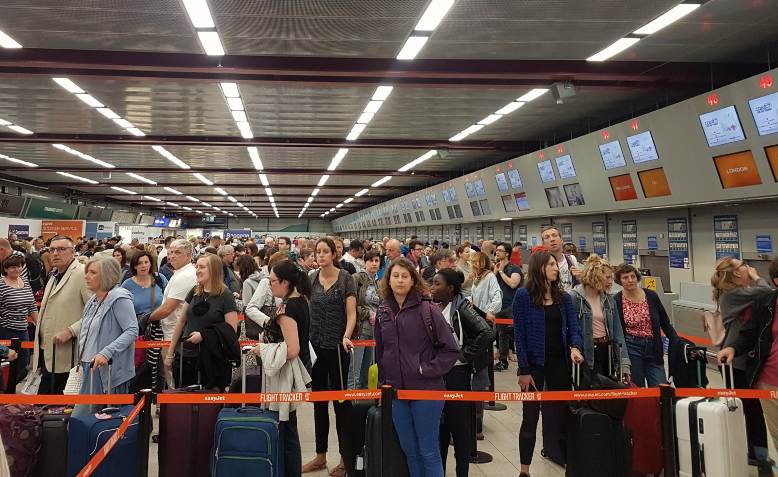 Luton airport queue. Photo: oatsy40 / Wikimedia Commons / CC BY 2.0, license linked below article
Luton airport queue. Photo: oatsy40 / Wikimedia Commons / CC BY 2.0, license linked below article
In the pursuit of maximising profit, airlines sacked thousands of workers and holidaymakers are now paying the price for their greed, writes Terina Hine
It’s a toss up which hell is worse: staying for the platinum pantomime or trying to escape for a half-term break. The royal indulgence is obviously painful to behold and impossible to avoid, but the travel chaos as families try to flee is a nightmare.
We have scenes of families sleeping on airport floors, waiting in eight-hour-long queues, only to find their flights are cancelled; of passengers kicked off planes or being carted around the country only to end up back home.
Almost 300 departures from major UK airports have been cancelled since 25 May. EasyJet cancelled 31 flights from Gatwick on Tuesday; British Airways are cancelling dozens with each day that passes. Tui announced they would be cancelling six flights from Manchester every day from now until the end of June.
Those stranded at airports are unable to find staff to ask for help. Those arriving find themselves waiting hours for baggage. For months, queues at passport control have been extreme. The disruption is countrywide: passengers at Gatwick, Stansted, Glasgow, Bristol, Manchester and Heathrow are all suffering. And now we are told the delays and disruption are likely to continue throughout the summer.
The pressure continues to mount as the four-day Jubilee weekend coincides with the school half-term holiday. There are almost 19,000 flights due to depart the UK this week, thousands of tickets sold, flights booked for weeks if not months, holidays planned and eagerly anticipated. Yet the industry has conspicuously failed to either plan or prepare. This is the first holiday period in over two years without Covid restrictions, who could have guessed it might be busy?
And so the blame game sets in. Huge staff shortages are responsible for huge delays. But who is responsible for these shortages? The government blames the airline industry for failing to anticipate demand, the airlines blame the airports for not ensuring enough staff on the ground, the airports blame the government.
The government insist they have been asking the industry to prepare for this surge in travel, the airlines counter saying the government have failed to take any responsibility, and could alleviate some of the pain by tackling the backlog in staff security checks. They also blame the lack of industry-specific assistance during the pandemic.
But it doesn’t stop there. Passengers have been blamed for arriving too early (unsurprisingly, given the queues) and causing extra congestion. And apparently thousands are inconsiderately cashing in their vouchers from Covid cancellations, resulting in a surge for seats. But really this was as predictable as rain on a Bank Holiday Monday.
Of course better planning, less over-booking of seats and the speeding up of new staff security checking procedures would have helped. But none of this would address the real issue: an exploitative industry relying for too long on low pay and poor working conditions to make sky-high profits.
In the interest of profit, airlines, airports and baggage handling companies sacked tens of thousands of staff during the pandemic, and now they are struggling to fill the vacancies they created. Those once employed have chosen not to return following the pandemic, finding better pay and better conditions elsewhere.
During the pandemic, jobs were ruthlessly cut - fire and rehire the order of the day. Sharon Graham, Unite General Secretary said, “when airline operators and others in aviation slashed jobs to boost profit, we warned this corporate greed would cause chaos in the industry.”
And the greed goes on. Passengers are failing to receive the compensation they are entitled to, or be offered alternative routes or adequate accommodation. And as easyJet grounded a flight from Gatwick to Cologne, Ryanair responded by selling seats to Cologne at a mere £225 for the one hour trip. A nice little earner for millionaire Michael O’Leary.
It is notable that last week when the RMT announced its strong mandate for strike action, the response from Transport Minister Grant Shapps was that the government is looking to impose legislation that would make strike action illegal without maintianing a “minimum service”. No such requirement is made for airline companies who are failing to provide the basic services they are being paid for because of their own greed-driven short-sightedness. As they did during the pandemic when airline jobs were being culled, the Tories have just sat by and let the airlines get away with it – their focus is instead on attacking workers who dare to defend themselves.
But workers are organising. British Airways is facing the possibility of strike action over pay in July. Check-in and ground handlers saw their pay slashed by 10% during the pandemic, and so far BA has refused to reverse this forced pay cut, while BA managers have had their pre-pandemic pay levels restored. If the strike goes ahead it will involve roughly half of Heathrow’s customer service team. Perhaps this week’s chaos will be a wake-up call for British Airways’ management.
What we are witnessing is the consequence of an aviation industry that refuses to pay decent wages but makes billions in profit. An industry where a management imposes mass sackings, implements fire-and-rehire policies, pays wages too low to live on, and offers terms and conditions so poor that experienced workers refuse to return. With chaos on their side, workers can at last demand change, and expect to win.
Before you go
Counterfire is growing faster than ever before
We need to raise £20,000 as we are having to expand operations. We are moving to a bigger, better central office, upping our print run and distribution, buying a new printer, new computers and employing more staff.

